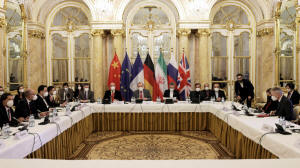Iran oil exports focus of Vienna nuclear talks, top Iranian diplomat
says
 Send a link to a friend
Send a link to a friend
 [December 27, 2021]
(Reuters) -Iran’s main focus in
nuclear talks that resume in Austria on Monday will be the lifting of
all U.S. sanctions in a verifiable process that guarantees Tehran’s
unhindered ability to export its oil, Iran's foreign minister said. [December 27, 2021]
(Reuters) -Iran’s main focus in
nuclear talks that resume in Austria on Monday will be the lifting of
all U.S. sanctions in a verifiable process that guarantees Tehran’s
unhindered ability to export its oil, Iran's foreign minister said.
Negotiations with world powers to salvage Iran's 2015 nuclear accord,
the Joint Comprehensive Plan of Action (JCPOA), are to resume in Vienna
at 1800 (1700 GMT), state media reported.
"The most important issue for us is to reach a point where, firstly,
Iranian oil can be sold easily and without hindrance,” Iranian media
quoted Foreign Minister Hossein Amirabdollahian as saying.
"The money from the oil (sales) is to be deposited as foreign currency
in Iranian banks - so we can enjoy all the economic benefits stipulated
in Joint Comprehensive Plan of Action."
In 2018, then U.S. President Donald Trump withdrew from the JCPOA and
reimposed stringent economic sanctions against Tehran, which responded a
year later by resuming and then accelerating its enrichment of uranium,
a potential pathway to nuclear weapons.
Oil exports, Iran’s main revenue source, have plunged under the U.S.
sanctions. Tehran does not disclose data, but assessments based on
shipping and other sources suggest a fall from about 2.8 million barrels
per day (bpd) in 2018 to as low as 200,000 bpd. One survey put exports
at 600,000 bpd in June.

The nuclear talks have made scant progress since they resumed last month
after a five-month hiatus following the election of hardline Iranian
President Ebrahim Raisi.
“Today, there is an acceptable joint document on the negotiating table
that we call the December 1 and December 15 documents,” Amirabdollahian
said. Both documents, he said, related to the nuclear issue as well as
U.S. sanctions.
“From today, our negotiations will start on the basis of this joint
document. Guarantees and verification are among the issues on the
agenda,” Amirabdollahian said.
[to top of second column]
|

Deputy Secretary General of the European External Action Service (EEAS)
Enrique Mora and Iran's chief nuclear negotiator Ali Bagheri Kani
and delegations wait for the start of a meeting of the JCPOA Joint
Commission in Vienna, Austria December 17, 2021. EU Delegation in
Vienna/EEAS/Handout via REUTERS
 Iran's two draft texts, submitted on
Nov. 26 in Vienna, were modified versions of those drawn up in June
under the previous Iranian administration.
Under the 2015 deal, Iran limited its uranium enrichment programme
in return for relief from U.S., EU and U.N. economic sanctions. Iran
says its nuclear programme is for solely peaceful purposes.
At the last round of talks, senior British, French and German
diplomats offered a pessimistic assessment of efforts to revive the
deal. U.S. National Security Adviser Jake Sullivan said last week
that the U.S. and its partners were discussing timeframes for
nuclear diplomacy with Iran, adding that the current talks may be
exhausted within weeks.
Iranian Foreign Ministry spokesman Saeed Khatibzadeh said on Monday
the Iran side would not accept any deadlines. A source close to
Iran’s team told Reuters that the delegation would stay in Vienna
for as long as is needed.
Iran's arch foe, Israel, which is not involved in the talks, said
the main challenge was "preventing a nuclear Iran".
"Israel is not opposed to any deal," Israeli Foreign Minister Yair
Lapid told parliament's Foreign Affairs and Defence Committee in
Jerusalem on Monday.
"A good deal would be good. We oppose a deal that does not enable
true oversight over the Iranian nuclear programme, nor over the
Iranian money, nor over the Iranian terror network."
(Additional reporting by Dan Williams in Jerusalem; Editing by Nick
Macfie)
[© 2021 Thomson Reuters. All rights
reserved.] Copyright 2021 Reuters. All rights reserved. This material may not be published,
broadcast, rewritten or redistributed.
Thompson Reuters is solely responsible for this content.
 |